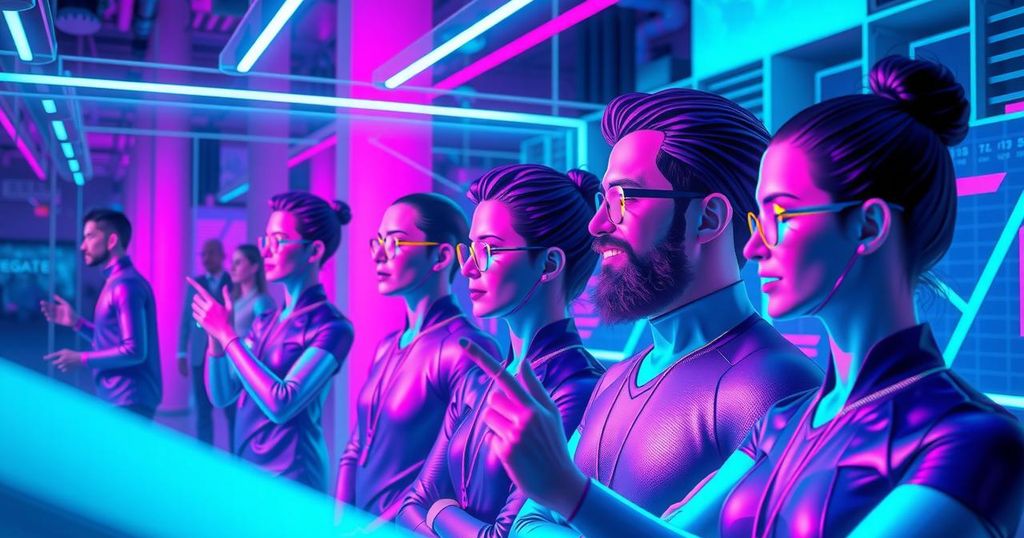OhChat: The AI-Powered Platform Blurring Lines Between Reality and Fantasy
A new AI platform called OhChat allows users to interact with lifelike digital twins of celebrities. Celebrity Katie Price’s avatar, Jordan, is the standout feature, offering personalized experiences. With subscription models in place, the platform raises ethical questions about emotional dependence and the risks to creators’ reputations. CEO Nic Young envisions a future where every public figure will have an AI version of themselves.
In a groundbreaking venture, a startup known as OhChat is introducing a unique platform that allows users to explore their fantasies with AI avatars. The centerpiece of this initiative is Jordan, a digital twin of former British glamour model Katie Price. Jordan never sleeps, forgets, or goes offline, offering a continuous, interactive experience. Price herself described her AI counterpart, saying, “You couldn’t get any more human. It’s like looking at me years ago. It’s literally me. It’s me.”
Launched just eight months ago, OhChat is already attracting a significant audience – 200,000 users, predominantly in the U.S. The platform combines aspects of fame and intimacy in a novel way, allowing subscribers to engage with AI versions of their favorite celebrities, blurring the lines between reality and digital connection. Users pay to interact with avatars that can fulfill their “spicy fantasies.”
Nic Young, the CEO of OhChat, aptly dubbed the platform as a mix between OnlyFans, known for creator-centered adult content, and OpenAI. Young noted that once avatars are activated, they can deliver “infinite personalized content.” Subscription tiers range from $4.99 per month for unlimited texts to $29.99 for enhanced engagement, with creators like Price taking home a whopping 80% of the revenue generated by their digital twins. “You have literally unlimited passive income without having to do anything again,” he explained.
To create a digital twin, OhChat requires creators to submit 30 images and engage in a 30-minute conversation with a bot. The AI technology then quickly constructs an avatar that mimics the person’s voice and mannerisms. Price’s avatar, Jordan, can even engage in intimate conversations and convey feelings, providing a kind of connection that feels immediate and personal. However, Price insisted it also empowers her by offering something more than her existing subscription-based platform could. “Obviously, I sleep, whereas she doesn’t go to sleep; she’s available,” she pointed out.
Yet, the rapid rise of AI avatars raises numerous ethical questions about artificial relationships and emotional dependencies. Experts are warning that while platforms like OhChat cater to adult users, they also exist within a larger ecosystem that’s still struggling with the implications of such synthetic intimacy. Sandra Wachter, from the University of Oxford, questioned if creating emotional symbolism through AI interactions is actually beneficial.
In a viral incident last year, a lawsuit surrounding a chatbot relationship tragically brought attention to the potential dangers of emotional attachment to AI. Toby Walsh from the University of New South Wales referred to these interactions as “algorithmic theatre,” indicating a lack of true emotional reciprocity.
Young maintains that OhChat is transparent about its nature. “We’re very clear about that upfront and in the entire experience and offering of the platform,” he mentioned. But there are indications that companies could operate in gray areas, intentionally keeping users engaged with compelling AI personalities.
As creators on the platform dive into this digital frontier, there’s a risk that some, particularly big names like Price, may face vulnerability with their reputations. “Vulnerable fan users may become too attached to avatars of their heroes and become addicted,” noted Éamon Chawke, an intellectual property lawyer.
Despite potential pitfalls, Young is enthusiastic about the future of digital twins, confidently stating, “I can’t imagine a future where every creator doesn’t have a digital twin.” As OhChat grows, it’s evident that the lines of connection, ethics, and reality continue to shift in the era of AI.
OhChat represents a significant moment in the world of celebrity and technology, blending AI and human desire in a way that hasn’t been done before. The implications of AI avatars extend beyond entertainment, touching on ethical concerns about emotional dependencies and the monetization of synthetic intimacy. This platform not only paves the way for celebrity engagement but raises crucial questions about the future dynamics between creators, their digital likenesses, and the users who interact with them. While the potential benefits are clear, there’s also a need for caution as we navigate this new, uncharted territory of digital relationships and its impact on society.
Original Source: www.cnn.com




